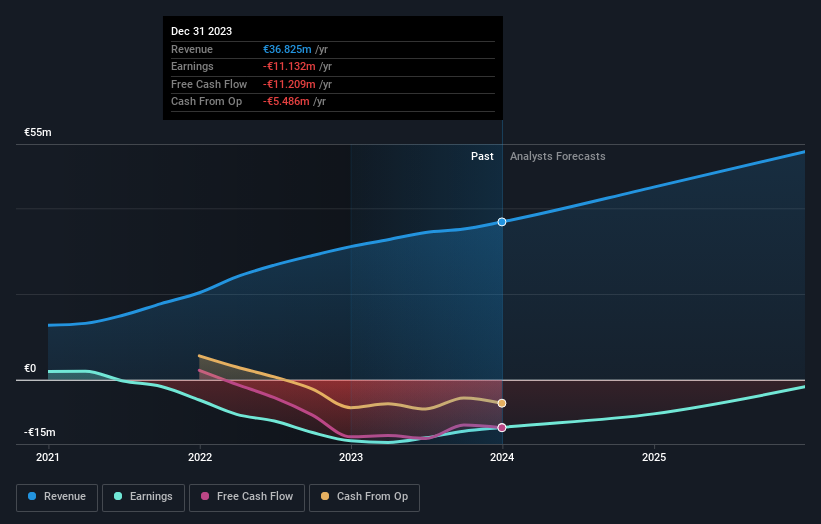- Norway
- /
- Healthtech
- /
- OB:NORDH
Nordhealth AS' (OB:NORDH) most bullish insider is CEO Charles MacBain, and their holdings value went up by 12% last week

Key Insights
- Nordhealth's significant insider ownership suggests inherent interests in company's expansion
- A total of 3 investors have a majority stake in the company with 50% ownership
- 22% of Nordhealth is held by Institutions
If you want to know who really controls Nordhealth AS (OB:NORDH), then you'll have to look at the makeup of its share registry. We can see that individual insiders own the lion's share in the company with 44% ownership. In other words, the group stands to gain the most (or lose the most) from their investment into the company.
As a result, insiders were the biggest beneficiaries of last week’s 12% gain.
In the chart below, we zoom in on the different ownership groups of Nordhealth.
View our latest analysis for Nordhealth

What Does The Institutional Ownership Tell Us About Nordhealth?
Many institutions measure their performance against an index that approximates the local market. So they usually pay more attention to companies that are included in major indices.
Nordhealth already has institutions on the share registry. Indeed, they own a respectable stake in the company. This suggests some credibility amongst professional investors. But we can't rely on that fact alone since institutions make bad investments sometimes, just like everyone does. If multiple institutions change their view on a stock at the same time, you could see the share price drop fast. It's therefore worth looking at Nordhealth's earnings history below. Of course, the future is what really matters.

Hedge funds don't have many shares in Nordhealth. The company's CEO Charles MacBain is the largest shareholder with 38% of shares outstanding. In comparison, the second and third largest shareholders hold about 8.1% and 4.1% of the stock.
After doing some more digging, we found that the top 3 shareholders collectively control more than half of the company's shares, implying that they have considerable power to influence the company's decisions.
While it makes sense to study institutional ownership data for a company, it also makes sense to study analyst sentiments to know which way the wind is blowing. There is a little analyst coverage of the stock, but not much. So there is room for it to gain more coverage.
Insider Ownership Of Nordhealth
The definition of company insiders can be subjective and does vary between jurisdictions. Our data reflects individual insiders, capturing board members at the very least. Company management run the business, but the CEO will answer to the board, even if he or she is a member of it.
Most consider insider ownership a positive because it can indicate the board is well aligned with other shareholders. However, on some occasions too much power is concentrated within this group.
Our most recent data indicates that insiders own a reasonable proportion of Nordhealth AS. It has a market capitalization of just kr2.4b, and insiders have kr1.1b worth of shares in their own names. We would say this shows alignment with shareholders, but it is worth noting that the company is still quite small; some insiders may have founded the business. You can click here to see if those insiders have been buying or selling.
General Public Ownership
With a 34% ownership, the general public, mostly comprising of individual investors, have some degree of sway over Nordhealth. While this size of ownership may not be enough to sway a policy decision in their favour, they can still make a collective impact on company policies.
Next Steps:
I find it very interesting to look at who exactly owns a company. But to truly gain insight, we need to consider other information, too. To that end, you should learn about the 2 warning signs we've spotted with Nordhealth (including 1 which is potentially serious) .
If you are like me, you may want to think about whether this company will grow or shrink. Luckily, you can check this free report showing analyst forecasts for its future.
NB: Figures in this article are calculated using data from the last twelve months, which refer to the 12-month period ending on the last date of the month the financial statement is dated. This may not be consistent with full year annual report figures.
Valuation is complex, but we're here to simplify it.
Discover if Nordhealth might be undervalued or overvalued with our detailed analysis, featuring fair value estimates, potential risks, dividends, insider trades, and its financial condition.
Access Free AnalysisHave feedback on this article? Concerned about the content? Get in touch with us directly. Alternatively, email editorial-team (at) simplywallst.com.
This article by Simply Wall St is general in nature. We provide commentary based on historical data and analyst forecasts only using an unbiased methodology and our articles are not intended to be financial advice. It does not constitute a recommendation to buy or sell any stock, and does not take account of your objectives, or your financial situation. We aim to bring you long-term focused analysis driven by fundamental data. Note that our analysis may not factor in the latest price-sensitive company announcements or qualitative material. Simply Wall St has no position in any stocks mentioned.
About OB:NORDH
Nordhealth
Provides healthcare software solutions in Norway, Finland, Sweden, Denmark, Germany, and internationally.
Flawless balance sheet with reasonable growth potential.


